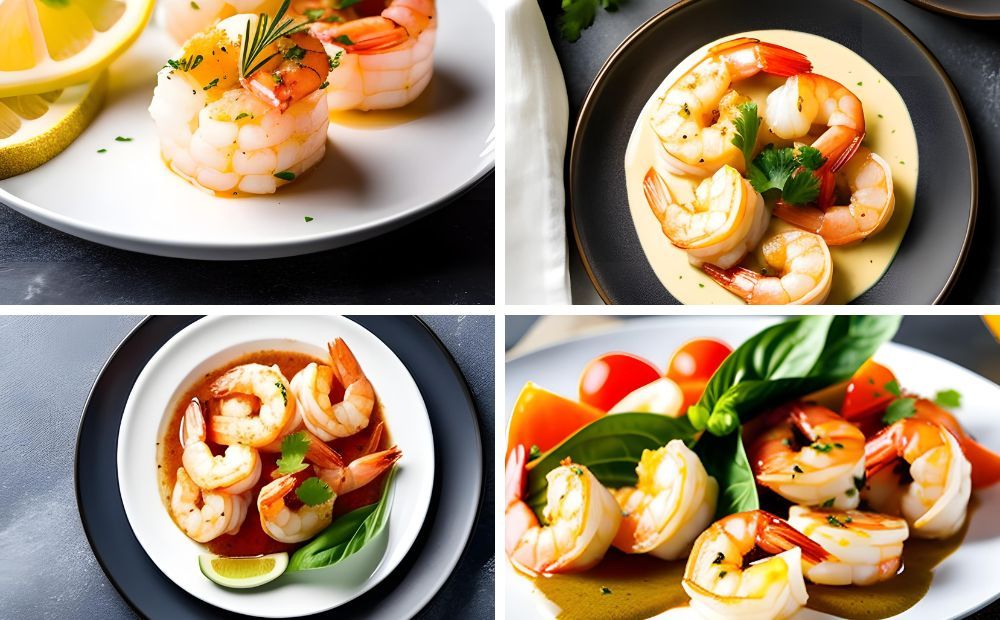In the realm of culinary arts and dietary sciences, there are often debates that seem to blur the lines between different food categories.
One such debate revolves around a simple yet intriguing question: Is shrimp meat?
This question might seem straightforward at first glance, but it opens up a Pandora's box of culinary and dietary discussions that can leave even the most knowledgeable food enthusiasts scratching their heads.
Shrimp, a beloved ingredient in various cuisines worldwide, is known for its unique flavor and versatility in numerous dishes. However, its classification has been a topic of debate among chefs, nutritionists, and food lovers alike.
Definition of Meat
The crux of the matter lies in how we define "meat" and whether or not shrimp fits into that definition.
In the biological sense, meat refers to the muscle tissue of an animal. Given that shrimp possess muscle tissue, they technically qualify as meat.
However, in the modern culinary context, shrimp, along with other sea creatures like crabs and lobsters, are typically categorized as seafood rather than meat. This categorization is more a matter of culinary tradition than biological accuracy.
The question then arises, why is there a separate category for seafood? Why isn't shrimp just considered meat like chicken or beef?
The answer lies in the dietary and cultural practices that have evolved over centuries.
Many dietary guidelines and cultural practices distinguish between land animals and sea creatures, leading to the separate categorization of seafood.
To delve deeper into this topic, let's explore the classification of shrimp and the dietary implications of considering shrimp meat.
3 Key Takeaways
- Shrimp is technically considered meat from a biological perspective as it consists of animal muscle tissue, but it's commonly referred to as seafood in culinary and dietary contexts.
- Shrimp, as a type of shellfish, stands out in terms of nutritional value, taste, and texture when compared to other meats, offering a unique and valuable addition to a balanced diet.
- Despite being high in cholesterol, shrimp is a good source of protein and essential nutrients, making it a healthier alternative to red and white meats for those managing their weight or cholesterol levels.
Is Shrimp Meat?
From a biological perspective, shrimp meat is indeed considered meat. This is because the term "meat" technically refers to the muscle tissue of an animal.
Shrimp, like all animals, have muscle tissue that allows them to move and function. This muscle tissue is what we consume when we eat shrimp meat.
Therefore, if we strictly adhere to the biological definition, shrimp is meat.
Culinary and Dietary Perspectives
However, the modern culinary and dietary perspective offers a different viewpoint. In the culinary world, the term "meat" is often reserved for the flesh of land animals like cows, pigs, and chickens.
Shrimp, despite being an animal and having muscle tissue, is commonly referred to as seafood and not meat. This categorization is more a reflection of culinary tradition and dietary guidelines than biological accuracy.
The distinction between seafood and meat in dietary guidelines often stems from the nutritional differences between the two. Seafood, including shrimp, is generally lower in fat and calories compared to red and white meats.
It is also a good source of omega-3 fatty acids, which are beneficial for heart health. On the other hand, meat, especially red meat, is higher in saturated fat and cholesterol, which can contribute to heart disease when consumed in excess.
Cultural and Religious Practices
Moreover, cultural and religious practices also play a significant role in this distinction. For instance, in certain religions and cultures, followers are allowed to consume seafood during periods when the consumption of meat is prohibited.
While shrimp meat is technically meat from a biological perspective, it is commonly referred to as seafood in the culinary and dietary context.
This distinction is a reflection of the nutritional differences, as well as cultural and religious practices.
For a more detailed understanding of the nutritional aspects of shrimp, you can refer to this Iodine - Health Professional Fact Sheet.
The Classification of Shrimp

In the world of marine biology, shrimp is classified as a type of shellfish, similar to crabs and lobsters.
Shellfish is a colloquial term used to describe exoskeleton-bearing aquatic invertebrates used as food, including various species of molluscs, crustaceans, and echinoderms. Shrimp, being a crustacean, falls under this broad category.
Despite the term "shellfish", it's important to note that not all shellfish are fish. In fact, from a biological standpoint, shellfish aren't even classified as fish. They are invertebrates, while fish are vertebrates.
This distinction, however, doesn't change the fact that all seafood, including shrimp, is technically meat. As previously discussed, meat refers to the muscle tissue of an animal, and shrimp, like all animals, have muscle tissue.
The Dietary Perspective
From a dietary perspective, considering shrimp meat has several implications. For starters, shrimp is a good source of protein, much like other types of meat.
It's also low in fat and calories, making it a healthier alternative to red and white meats for those watching their weight or managing their cholesterol levels.
Interestingly, some diets that restrict the consumption of meat still allow the intake of seafood, including shrimp.
This is often the case in certain religious practices and dietary philosophies that distinguish between land animals and sea creatures.
For example, during Lent, many Christians abstain from eating meat on Fridays, but seafood is often considered permissible.
Furthermore, some people follow a pescatarian diet, which excludes meat but includes fish and other seafood.
This dietary choice is often motivated by health reasons, ethical concerns about animal welfare, or environmental sustainability considerations.
For these individuals, shrimp and other seafood serve as important sources of protein and other nutrients.
While shrimp is classified as a shellfish and often categorized as seafood in culinary contexts, it is technically meat from a biological and nutritional standpoint.
This understanding can help inform dietary choices and provide a clearer perspective on the diverse world of food.
Shrimp vs. Other Meats
When comparing shrimp to other types of meat, several factors come into play, including nutritional value, taste, and texture.
In terms of nutritional value, shrimp is a powerhouse. It's high in protein and contains a variety of essential nutrients, including selenium, vitamin B12, and phosphorus.
Shrimp is also a good source of omega-3 fatty acids, which are known for their heart health benefits.
Compared to red and white meats, shrimp is lower in calories and fat, making it a healthier choice for those watching their weight or managing their cholesterol levels.
The taste of shrimp is distinct and often described as more delicate compared to the robust flavors of red meat.
It has a sweet, slightly briny flavor that pairs well with a wide range of ingredients. The taste of shrimp can also vary depending on its size and the water where it was caught.
The texture of shrimp is another distinguishing factor. When cooked properly, shrimp has a firm yet tender texture that's quite different from the fibrous texture of meats like beef or pork.
Overcooked shrimp can become tough and rubbery, so careful preparation is key.
While there are many health benefits associated with consuming shrimp, there are also potential concerns.
Shrimp is high in cholesterol, which might be a concern for individuals with certain health conditions. However, recent research suggests that the cholesterol found in food has less of an impact on blood cholesterol levels than previously thought.
Moreover, some people are allergic to shrimp and other shellfish, which can cause severe reactions.
It's also important to source shrimp responsibly, as unsustainable shrimp farming practices can have negative environmental impacts.
While shrimp is technically a type of meat, it differs significantly from other meats in terms of nutritional value, taste, and texture. These differences make shrimp a unique and valuable addition to a balanced diet.
Conclusion
Throughout this article, we've explored the question, "Is shrimp fish or meat?" from various perspectives.
From a biological standpoint, shrimp is indeed considered meat as it consists of animal muscle tissue. However, in culinary and dietary contexts, shrimp is typically categorized as seafood, not meat.
This distinction is largely due to traditional culinary classifications and certain dietary guidelines that differentiate between land animals and sea creatures.
We've also delved into the classification of shrimp as a type of shellfish, similar to crabs and lobsters. Despite the term "shellfish", it's important to note that not all shellfish are fish. They are invertebrates, while fish are vertebrates.
From a dietary perspective, shrimp is a good source of protein, much like other types of meat. It's also low in fat and calories, making it a healthier alternative to red and white meats for those watching their weight or managing their cholesterol levels.
When compared to other meats, shrimp stands out in terms of nutritional value, taste, and texture. It's high in protein and contains a variety of essential nutrients.
The taste of shrimp is distinct and often described as more delicate compared to the robust flavors of red meat. The texture of shrimp, when cooked properly, is firm yet tender.
While shrimp is technically meat from a biological perspective, it is commonly referred to as seafood in the culinary and dietary context. This understanding can help inform dietary choices and provide a clearer perspective on the diverse world of food.
FAQs
Is shrimp considered a red meat or white meat?
Shrimp is neither classified as red meat nor white meat. It is generally categorized as seafood. The terms "red meat" and "white meat" are typically used to describe various types of mammalian and poultry flesh, respectively.
Is shrimp a good source of protein?
Yes, shrimp is an excellent source of protein. A 3-ounce serving of cooked shrimp provides about 18 grams of protein, making it a great choice for those looking to increase their protein intake.
Can vegetarians eat shrimp?
Whether or not a vegetarian can eat shrimp depends on the individual's specific dietary guidelines. Some vegetarians include seafood in their diet, a practice known as pescetarianism. However, strict vegetarians and vegans do not consume shrimp or any other animal products.
Is shrimp considered meat in a vegan diet?
No, shrimp is not considered acceptable in a vegan diet. Vegans abstain from all animal products, including meat, dairy, eggs, and seafood.
Does shrimp have the same nutritional value as meat?
While shrimp and meat both provide high-quality protein, their nutritional profiles differ. Shrimp is lower in calories and fat compared to most meats but is higher in cholesterol. It also contains different types and amounts of vitamins and minerals.
Is shrimp farming harmful to the environment?
Shrimp farming can have negative environmental impacts, including habitat destruction, water pollution, and overfishing of wild shrimp populations. However, sustainably managed shrimp farms can minimize these impacts.
Can you eat raw shrimp or fresh shrimp?
Eating raw shrimp is not recommended due to the risk of foodborne illnesses. Fresh shrimp, however, can be safely consumed when properly cooked and handled.
Where do you find brown shrimp?
Brown shrimp are commonly found in the Atlantic Ocean, from Massachusetts to Texas, and are particularly abundant in the Gulf of Mexico. They inhabit muddy bottoms near estuaries and bays.
If you are in the market for some quality knives, then check out our articles below where you will find our top picks.














